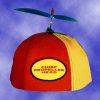No posts in this forum for a while, so I thought I'd stir the pot some....
Just got back from 8 glorious days at Nellis, where the flowers are in bloom and the ballet is in fine form. But I left with a bad taste in my mouth, for once in an intellectual (and not literal...) sense. Got to observe some of my USAF intel brethren, who were Weapons School students. Yes, intel has it's own Weapons School, which is actually what this thread is about.
By and large, I was extremely impressed by the Weapons School students and their curriculum. They are getting exposed to concepts, systems, and material that will greatly benefit them later in their careers - info that their Navy counterparts will be lucky to pick up through osmosis, which seems to be the Navy's primary means for mid-grade intel training / professional development. They also have the advantage of mixing and matching with the other MDS weapons school types, both formally and informally. The capstone of the whole program, ME (Mission Employment) phase, brings it all together into incredibly complex problems that the Weapons School students get to plan and solve. Enormous red-ass if you're a student, a lot of fun and eye-opening if you are a visiting supporting player/aircrew. (They always need extra Prowlers...)
So what's the bad taste in my mouth? Professional jealousy, I guess. How come I can't go to a Weapons School and get a nifty patch? Why doesn't the Navy seem to have the same outlook on "ISR as a weapon system"? There is a convergence going on between the strike and the ISR sides of our business, and both sides are going to have to meet somewhere in the middle - and I don't think OJT is going to cut it on the intel side. We (Navy intel) are going to have to get serious about being professionals in the ISR business, and not continuing to spread ourselves thin across our careers, as we switch from strike intel to Kraplakistan terrorism to SPECWAR support. I want to homestead in strike warfare support, and I'd like to have a professional development path that allows it. Otherwise, it's not hard for me to foresee a time in the future when we will be dependent on Big Blue for the complete range of ISR support, just as we are dependent on them for tanker support.
(BTW, did see one of the better callsigns I've run across in a while: female intel O, who was generally big (but not unattractive); might have been a Div 1 basketball or volleyball player. Callsign: TABY - That's a Big B!tch, Yo...)
Just got back from 8 glorious days at Nellis, where the flowers are in bloom and the ballet is in fine form. But I left with a bad taste in my mouth, for once in an intellectual (and not literal...) sense. Got to observe some of my USAF intel brethren, who were Weapons School students. Yes, intel has it's own Weapons School, which is actually what this thread is about.
By and large, I was extremely impressed by the Weapons School students and their curriculum. They are getting exposed to concepts, systems, and material that will greatly benefit them later in their careers - info that their Navy counterparts will be lucky to pick up through osmosis, which seems to be the Navy's primary means for mid-grade intel training / professional development. They also have the advantage of mixing and matching with the other MDS weapons school types, both formally and informally. The capstone of the whole program, ME (Mission Employment) phase, brings it all together into incredibly complex problems that the Weapons School students get to plan and solve. Enormous red-ass if you're a student, a lot of fun and eye-opening if you are a visiting supporting player/aircrew. (They always need extra Prowlers...)
So what's the bad taste in my mouth? Professional jealousy, I guess. How come I can't go to a Weapons School and get a nifty patch? Why doesn't the Navy seem to have the same outlook on "ISR as a weapon system"? There is a convergence going on between the strike and the ISR sides of our business, and both sides are going to have to meet somewhere in the middle - and I don't think OJT is going to cut it on the intel side. We (Navy intel) are going to have to get serious about being professionals in the ISR business, and not continuing to spread ourselves thin across our careers, as we switch from strike intel to Kraplakistan terrorism to SPECWAR support. I want to homestead in strike warfare support, and I'd like to have a professional development path that allows it. Otherwise, it's not hard for me to foresee a time in the future when we will be dependent on Big Blue for the complete range of ISR support, just as we are dependent on them for tanker support.
(BTW, did see one of the better callsigns I've run across in a while: female intel O, who was generally big (but not unattractive); might have been a Div 1 basketball or volleyball player. Callsign: TABY - That's a Big B!tch, Yo...)




